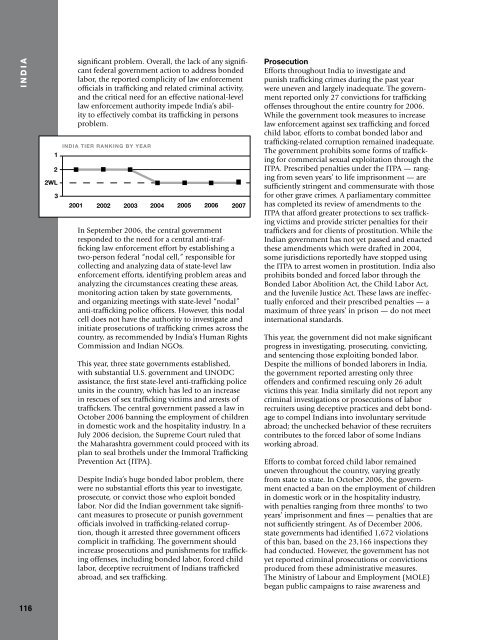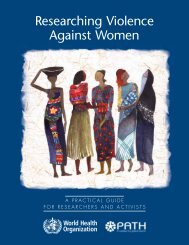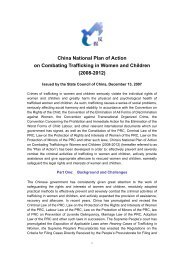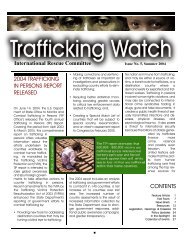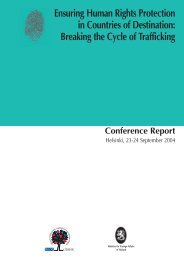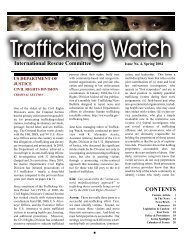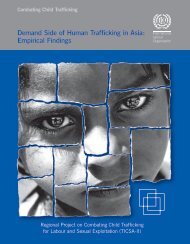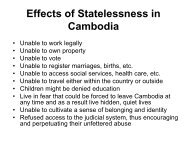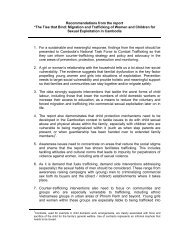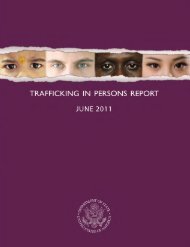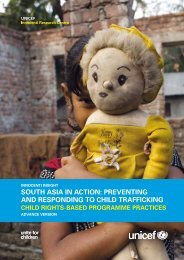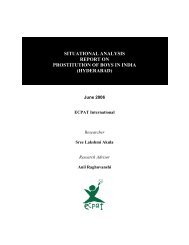2007 Trafficking in Persons Report - Center for Women Policy Studies
2007 Trafficking in Persons Report - Center for Women Policy Studies
2007 Trafficking in Persons Report - Center for Women Policy Studies
Create successful ePaper yourself
Turn your PDF publications into a flip-book with our unique Google optimized e-Paper software.
I N D I A<br />
significant problem. Overall, the lack of any significant<br />
federal government action to address bonded<br />
labor, the reported complicity of law en<strong>for</strong>cement<br />
officials <strong>in</strong> traffick<strong>in</strong>g and related crim<strong>in</strong>al activity,<br />
and the critical need <strong>for</strong> an effective national-level<br />
law en<strong>for</strong>cement authority impede India’s ability<br />
to effectively combat its traffick<strong>in</strong>g <strong>in</strong> persons<br />
problem.<br />
In September 2006, the central government<br />
responded to the need <strong>for</strong> a central anti-traffick<strong>in</strong>g<br />
law en<strong>for</strong>cement ef<strong>for</strong>t by establish<strong>in</strong>g a<br />
two-person federal “nodal cell,” responsible <strong>for</strong><br />
collect<strong>in</strong>g and analyz<strong>in</strong>g data of state-level law<br />
en<strong>for</strong>cement ef<strong>for</strong>ts, identify<strong>in</strong>g problem areas and<br />
analyz<strong>in</strong>g the circumstances creat<strong>in</strong>g these areas,<br />
monitor<strong>in</strong>g action taken by state governments,<br />
and organiz<strong>in</strong>g meet<strong>in</strong>gs with state-level “nodal”<br />
anti-traffick<strong>in</strong>g police officers. However, this nodal<br />
cell does not have the authority to <strong>in</strong>vestigate and<br />
<strong>in</strong>itiate prosecutions of traffick<strong>in</strong>g crimes across the<br />
country, as recommended by India’s Human Rights<br />
Commission and Indian NGOs.<br />
This year, three state governments established,<br />
with substantial U.S. government and UNODC<br />
assistance, the first state-level anti-traffick<strong>in</strong>g police<br />
units <strong>in</strong> the country, which has led to an <strong>in</strong>crease<br />
<strong>in</strong> rescues of sex traffick<strong>in</strong>g victims and arrests of<br />
traffickers. The central government passed a law <strong>in</strong><br />
October 2006 bann<strong>in</strong>g the employment of children<br />
<strong>in</strong> domestic work and the hospitality <strong>in</strong>dustry. In a<br />
July 2006 decision, the Supreme Court ruled that<br />
the Maharashtra government could proceed with its<br />
plan to seal brothels under the Immoral <strong>Traffick<strong>in</strong>g</strong><br />
Prevention Act (ITPA).<br />
Despite India’s huge bonded labor problem, there<br />
were no substantial ef<strong>for</strong>ts this year to <strong>in</strong>vestigate,<br />
prosecute, or convict those who exploit bonded<br />
labor. Nor did the Indian government take significant<br />
measures to prosecute or punish government<br />
officials <strong>in</strong>volved <strong>in</strong> traffick<strong>in</strong>g-related corruption,<br />
though it arrested three government officers<br />
complicit <strong>in</strong> traffick<strong>in</strong>g. The government should<br />
<strong>in</strong>crease prosecutions and punishments <strong>for</strong> traffick<strong>in</strong>g<br />
offenses, <strong>in</strong>clud<strong>in</strong>g bonded labor, <strong>for</strong>ced child<br />
labor, deceptive recruitment of Indians trafficked<br />
abroad, and sex traffick<strong>in</strong>g.<br />
Prosecution<br />
Ef<strong>for</strong>ts throughout India to <strong>in</strong>vestigate and<br />
punish traffick<strong>in</strong>g crimes dur<strong>in</strong>g the past year<br />
were uneven and largely <strong>in</strong>adequate. The government<br />
reported only 27 convictions <strong>for</strong> traffick<strong>in</strong>g<br />
offenses throughout the entire country <strong>for</strong> 2006.<br />
While the government took measures to <strong>in</strong>crease<br />
law en<strong>for</strong>cement aga<strong>in</strong>st sex traffick<strong>in</strong>g and <strong>for</strong>ced<br />
child labor, ef<strong>for</strong>ts to combat bonded labor and<br />
traffick<strong>in</strong>g-related corruption rema<strong>in</strong>ed <strong>in</strong>adequate.<br />
The government prohibits some <strong>for</strong>ms of traffick<strong>in</strong>g<br />
<strong>for</strong> commercial sexual exploitation through the<br />
ITPA. Prescribed penalties under the ITPA — rang<strong>in</strong>g<br />
from seven years’ to life imprisonment — are<br />
sufficiently str<strong>in</strong>gent and commensurate with those<br />
<strong>for</strong> other grave crimes. A parliamentary committee<br />
has completed its review of amendments to the<br />
ITPA that af<strong>for</strong>d greater protections to sex traffick<strong>in</strong>g<br />
victims and provide stricter penalties <strong>for</strong> their<br />
traffickers and <strong>for</strong> clients of prostitution. While the<br />
Indian government has not yet passed and enacted<br />
these amendments which were drafted <strong>in</strong> 2004,<br />
some jurisdictions reportedly have stopped us<strong>in</strong>g<br />
the ITPA to arrest women <strong>in</strong> prostitution. India also<br />
prohibits bonded and <strong>for</strong>ced labor through the<br />
Bonded Labor Abolition Act, the Child Labor Act,<br />
and the Juvenile Justice Act. These laws are <strong>in</strong>effectually<br />
en<strong>for</strong>ced and their prescribed penalties — a<br />
maximum of three years’ <strong>in</strong> prison — do not meet<br />
<strong>in</strong>ternational standards.<br />
This year, the government did not make significant<br />
progress <strong>in</strong> <strong>in</strong>vestigat<strong>in</strong>g, prosecut<strong>in</strong>g, convict<strong>in</strong>g,<br />
and sentenc<strong>in</strong>g those exploit<strong>in</strong>g bonded labor.<br />
Despite the millions of bonded laborers <strong>in</strong> India,<br />
the government reported arrest<strong>in</strong>g only three<br />
offenders and confirmed rescu<strong>in</strong>g only 26 adult<br />
victims this year. India similarly did not report any<br />
crim<strong>in</strong>al <strong>in</strong>vestigations or prosecutions of labor<br />
recruiters us<strong>in</strong>g deceptive practices and debt bondage<br />
to compel Indians <strong>in</strong>to <strong>in</strong>voluntary servitude<br />
abroad; the unchecked behavior of these recruiters<br />
contributes to the <strong>for</strong>ced labor of some Indians<br />
work<strong>in</strong>g abroad.<br />
Ef<strong>for</strong>ts to combat <strong>for</strong>ced child labor rema<strong>in</strong>ed<br />
uneven throughout the country, vary<strong>in</strong>g greatly<br />
from state to state. In October 2006, the government<br />
enacted a ban on the employment of children<br />
<strong>in</strong> domestic work or <strong>in</strong> the hospitality <strong>in</strong>dustry,<br />
with penalties rang<strong>in</strong>g from three months’ to two<br />
years’ imprisonment and f<strong>in</strong>es — penalties that are<br />
not sufficiently str<strong>in</strong>gent. As of December 2006,<br />
state governments had identified 1,672 violations<br />
of this ban, based on the 23,166 <strong>in</strong>spections they<br />
had conducted. However, the government has not<br />
yet reported crim<strong>in</strong>al prosecutions or convictions<br />
produced from these adm<strong>in</strong>istrative measures.<br />
The M<strong>in</strong>istry of Labour and Employment (MOLE)<br />
began public campaigns to raise awareness and<br />
116


